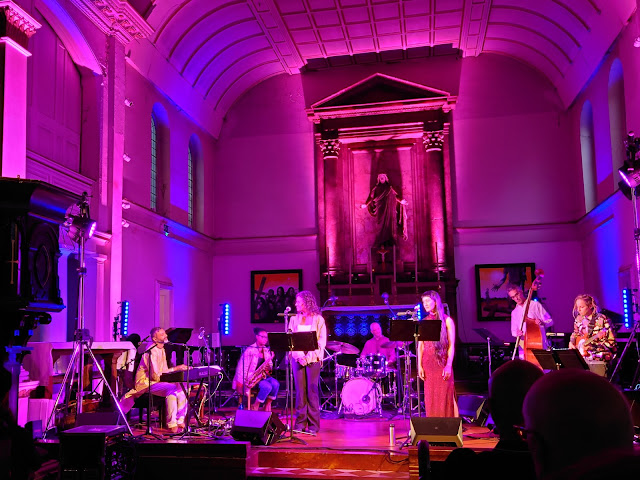 |
| Arun Ghosh: The Canticle of the Sun - Arun Ghosh & ensemble - Spitalfields Festival at St John on Bethnal Green |
Arun Ghosh: The Canticle of the Sun; Arun Shosh, Irini Arabatzi, Seaming To, Camilla George, Sarathy Korwar, Ruth Goller, Davide Mantovani; Spitalfields Music at St John on Bethnal Green
Ghosh set St Francis' text in the original Umbrian dialect, sung by Irini Arabatzi and Seaming To, accompanied by Arun Ghosh on keyboards (with some guitar and clarinet), Camilla George on alto saxophone, Sarathy Korwar on drums and percussion, Ruth Goller on electric bass and Davide Mantovani on double bass. Lighting was by Brendan Clarke with sound by Tim Hand.
The text was split up into ten sections, each prefaced by a spoken recitation of a key part of the English translation which pointed up the theme of that section, 'Brother Sun', 'Sister Moon and the stars', 'Brother Wind', 'Brother Fire', Sister Mother Earth', 'Those who give pardon', 'Those who endure in peace', 'Sister Bodily Death' and a final 'Praise and bless my Lord'. The style was very much composed jazz, highly structured but with space for instrumental riffs notably from Ghosh, George and Mantovani. The sound world was fascinatingly rhythmic; instrumentally, Ghosh placed a lot on the two bass instruments and the drum kit, with just his keyboards filling in harmony. In some sections this created a feeling of the two voices (usually in unison) over a rhythmic figure with little in the way of middle filling.
Each section had a particular character, with Ghosh showing an eclectic taste so that the music had elements of chant, laid-back late-night blues, minimalism and more. The styles also varied from the note crunching to the spare, and even at one point a feeling that a Country-style sing-along was not far away. But in each section, he would set up a rhythmic motif which was repeated, with variants, and the music would evolve over this. Whether fast or slow, this gave the music a fascinating sense of impetus, and even the most laid-back of music could be whipped up into strong climaxes. This meant that for all the eclecticism, it was Ghosh's own voice that was prominent.
He was a highly active participant in the drama, most of the evening he directed from the keyboards and his body language was almost as expressive as his playing. For 'Mother Earth' he moved to acoustic guitar and then during 'Sister Bodily Death' there was a stunning, climactic clarinet solo that moved from something rather Eastern Mediterranean and ancient into more jazz-inspired intensity. The ending, coming after this clarinet solo section, was aetherial and evocative, gradually unwinding to a satisfied close.
Lighting by Brandan Clarke was heavily involved in the changes of mood, though there was a rather over dependence on strong colours (see the above highly pink image), and I would have liked moments when we could see the players in a more natural light. This was a highly amplified evening, and whilst Tim Hand's sound set up gave us a strong clear sound, I felt that it was a little too much for the venue. Ghosh's approach was a long way from big-band screaming and a subtler sound scheme would have helped, but perhaps that is just the old fogey in me!
Given that Spitalfields Music presents such a diverse array of styles and genres, I felt that this presentation had missed a trick and that an early evening performance of Walton's fine choral setting of the text, Canticle del Sole (from 1974) might have been an interesting exercise in compare and contrast, and there are plenty of other settings of the text to explore from Donovan to Tõnu Kõrvits!
Never miss out on future posts by following us
The blog is free, but I'd be delighted if you were to show your appreciation by buying me a coffee.
Elsewhere on this blog
- New ways of working: composer Andrew Chen has two contrasting pieces at this year's Cheltenham Music Festival - interview
- Unsung Heroines: Lauren Fagan & Opera Holland Park Young Artists in a celebration of women composers and more - concert review
- An exciting rediscovery: Mercadante's Il proscritto proves far more than a museum piece in this thrilling revival from Opera Rara - opera review
- An afternoon delight: Anna Morrisey's inventive production of Rossini's The Barber of Seville at Nevill Holt Opera, in a finely musical performance conducted by Dinis Sousa - opera review
- Poetic drama & real musicality: highly imaginative Rusalka from Jack Furness at Garsington with Natalya Romaniw as a compelling water nymph - opera review
- Obsessed by voices: pianist Dylan Perez on recording the complete songs of Samuel Barber - interview
- Closeness & distance: Friedrich Cerha's evocation of Viennese traditional music in a new version for Viennese Schrammel quartet - record review
- Never such innocence: Benjamin Hewat-Craw & Yuhao Guo in RVW, Butterworth & Gurney - record review
- The Lost Art of Frances Cole: recordings from the 1970s provide a glimpse of the art of the Black American harpsichordist - record review
- Giving voice to unconventional instruments: the Lawrence Graduate Bayreuth Tuben Quintet - record review
- Madcap theatre & magnificent music: Janacek's The Excursions of Mr. Brouček at Grange Park Opera - opera review
- A strong affinity to melodic music: I chat to composer John Brunning about his works for guitar - interview
- Home

.jpg)









No comments:
Post a Comment